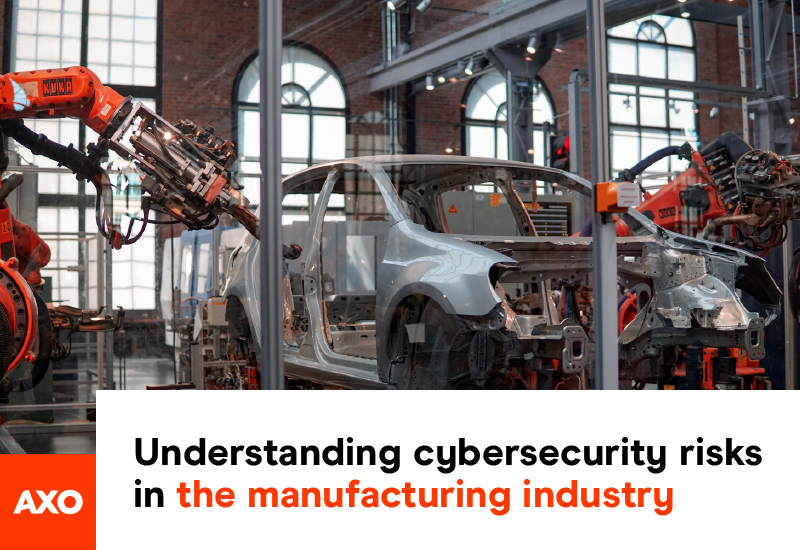
Cybersecurity is an ever-growing concern for businesses of all sizes, but perhaps none more so than those in the manufacturing industry.
The manufacturing world is becoming rapidly digitized with machines, connected devices, and AI for various applications, making them vulnerable to a wide range of cyber threats.
In the X-Force Threat Intelligence Index 2022 report, IBM found that the manufacturing industry was the most targeted sector for cyber attacks in 2021.
In this article, we’ll explore the various cybersecurity risks facing the manufacturing industry and the steps that can be taken to mitigate them. Read on to learn more.
Data breach continues to be a big problem for organizations worldwide, and manufacturers are no exception.
According to cybersecurity company Surfshark, Malaysia was the 11th most data-breached country in the second quarter of 2022.
This is why IT security has become the biggest concern for many business owners.

The manufacturing industry mainly relies on data from operations, planning, supply chain management, and much more.
Data is valuable to any modern manufacturer and is often very sensitive, especially customer data, financial, and intellectual property.
If cyber criminals gain access to this data, they can cause all sorts of damage. They can steal money and valuable assets or launch damaging attacks on the business or its customers.
This could include stealing customer data, hijacking accounts, launching ransomware attacks, etc.
These activities can have severe consequences for the business, such as loss of customer trust, financial losses, reputational damage, and more.
What they can do to counter this issue is to set up a risk mitigation strategy and data breach management plan. This step is critical to allow manufacturers to defend against and react quickly to data breaches, shutting down systems and locking out unauthorized persons in the event of a data breach.
Network security risks in the manufacturing industry can have serious consequences. It can compromise the integrity and safety of manufacturing processes, damaging equipment and causing data loss.
Sometimes, a network security breach could lead to personnel injuries.
For example, suppose a cyber attack compromises an industrial control system (ICS) that controls a production process. In that case, it could cause equipment to malfunction and physically harm workers.
Manufacturers should implement multiple network security measures to mitigate these risks, including firewalls, access controls, antivirus software, and two-factor authentication.
It is also important to regularly update and patch systems and educate employees on best practices for protecting the network.
Manufacturers should also implement robust security measures and have a well-defined incident response plan to address any security issues that may arise quickly.
A cybersecurity breach can lead to the theft of intellectual property (IP) if hackers can access sensitive company information, such as trade secrets, patents, or proprietary manufacturing processes.
This is a severe case, mainly if the manufacturer operates in a niche market and relies on IP to gain a competitive advantage.
This type of information can be valuable to competitors, and the theft of IP can have serious consequences for the affected company, including financial losses, reputational damage, and a loss of competitive advantage.
To prevent IP theft, manufacturing companies should implement strong cybersecurity strategies. This strategy can include data encryption, protecting endpoints, training employees in cybersecurity best practices, and using cybersecurity tools that can help monitor and detect threats.
Supply chain attacks can have severe consequences for companies and their customers. These attacks involve the compromise of a company's supply chain, which can include suppliers, manufacturers, logistics companies, and other partners that a company relies on to produce and distribute its products or services.
The attacks can take many forms, including malware infections, phishing attacks, insider threats, and physical attacks on the supply chain.

For example, in 2013, the retail giant Target suffered a significant data breach in which hackers accessed the company's systems through a compromised HVAC vendor.
The attack resulted in the theft of millions of customers’ personal and financial data and caused significant damage to the company's reputation.
There are various measures for manufacturers to mitigate the risk of supply chain attacks, including conducting regular security assessments, implementing strong security protocols and practices, and implementing robust incident response plans.
It is also essential to have strong relationships with their suppliers and partners and to ensure they are protecting their systems and data.
Phishing is a cyber attack in which an attacker sends a malicious email or other messages to a victim, attempting to trick the victim into divulging sensitive information or installing malware.
It is one of the most common methods in the manufacturing industry for stealing sensitive data, such as customer information and product designs.
One common tactic in phishing attacks is sending an email that appears to be from a trusted source, such as a financial institution or a company's IT department.
The email may contain a link that, when clicked, downloads malware onto the victim's device or directs the victim to a fake website where they are asked to enter sensitive information, such as login credentials or financial information.
If the victim falls for the phishing attack and provides their login credentials or installs the malware, the attacker can use these credentials to gain unauthorized access to the systems. This can allow the attacker to steal sensitive data, disrupt operations, or achieve financial gain.
To combat phishing attacks, it is vital for manufacturers to be aware of these tactics and to be cautious when receiving emails or messages from unknown or untrusted sources.
It can be done by conducting cybersecurity training for employees to ensure they know how to spot suspicious emails to prevent attacks.
Manufacturers can also implement technical measures, such as email filtering and two-factor authentication, to protect against phishing attacks.
Human error is a significant contributor to cyber risk in the manufacturing industry. Employees can inadvertently expose their organizations to cyber threats by clicking on malicious links or using weak passwords.
According to Global Risks Report released by the World Economic Forum, 95% of cybersecurity threats are caused by human error.
To reduce the risk of human error, manufacturers can conduct cybersecurity training for their employees.
They can ensure their employees are fully aware of the risks associated with cyber threats or know how to protect themselves and their organizations from them.
By doing this, manufacturers can lower the risk of their employees accidentally exposing the organization to cyber risk by clicking on malicious links, using weak passwords, or sharing sensitive information with unauthorized individuals.
Ransomware is a type of cyber attack in which an attacker encrypts a victim's data and demands payment in exchange for the decryption key.
These attacks can target businesses of all types and sizes, including manufacturers. There are several ways that ransomware can infect a network or device.
One way is using compromised devices that have already been infected with malicious software.
This can happen when an employee uses a personal device infected on the company's network or when a hacker gains access to a device through a vulnerability and installs the ransomware.
Another way ransomware can infect a network is through email attachments or file transfers. These attachments or files may appear legitimate, but they execute the ransomware and begin encryption when opened.
Manufacturers may initially think a ransomware attack is insignificant because they can reprogram their devices to restore normal operation.
However, this may be a challenging task. Depending on the device's complexity and the ransomware attack's nature, it may require specialized technical expertise to reprogram the device and restore it to its normal functioning state.
This could involve sending an engineer to the device’s location, which can incur additional costs for the manufacturer.
You can avoid the additional cost by implementing preventative measures to protect against ransomware attacks in the first place.
This can include regularly updating software and devices, using strong passwords, and regularly backing up important data to ensure that it is not lost in the event of an attack.
Invest in cyber security tools such as endpoint protection, web security gateways, and endpoint detection and response (EDR) solutions.
By taking these preventative measures, manufacturers can minimize the risk of a ransomware attack and reduce the impact on their operations.
The manufacturing industry is undergoing significant changes as new technologies are developed and adopted.
These technologies can bring many benefits, such as increased efficiency, improved quality, and reduced costs.
However, with new technologies also comes an increased risk of cybersecurity threats.
As manufacturers increasingly rely on connected devices, automation, and the internet to operate, they become more vulnerable to attacks from hackers and malicious actors.
It is important for manufacturers to be aware of these risks and to take steps to protect themselves.
Manufacturers should stay up-to-date with the latest technologies and proactively address cybersecurity risks.
By doing so, they can ensure that they can continue to operate effectively and securely in an increasingly digital landscape.
The team of specialists at AXO Technologies is highly skilled in handling all of your security needs.
By working with AXO Technologies, you can significantly strengthen your business's protection against cyber attacks and minimize the risk of a successful attack.
Don't wait until it's too late - contact AXO Technologies today to learn more about our comprehensive cybersecurity solutions and how we can help safeguard your business.